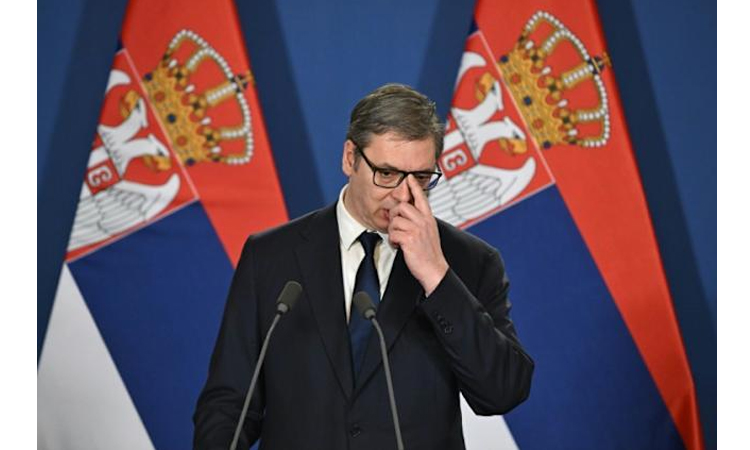News Flash
News Flash

PECINCI, April 10, 2025 (BSS/AFP) - Serbian President Aleksandar Vucic is rallying supporters in Belgrade on Saturday, claiming the country's peace and stability is threatened by months of protests against him.
The Balkan nation has been rocked by mounting unrest since November, when 16 people died in the collapse of the newly renovated Novi Sad station -- a tragedy widely blamed on corruption and poor oversight.
Hundreds of thousands have marched for months against corruption and in favour of a fairer system culminating in the biggest protests in decades last month.
But Vucic, who had dominated Serbian politics since his party came to power in 2012, wants to prove that a large chunk of the country is still behind him.
His ruling Serbian Progressive Party (SNS) controls much of Serbia, and claims to have 700,000 members -- a massive one in nine of the population.
The people of Pecinci, a village 50 kilometres (30 miles) northeast of Belgrade, voted overwhelmingly for the SNS in the local elections in June. And that support seems undiminished by the demonstrations.
"To me, all politicians seem the same," said Marija Vidakovic, a healthcare worker. "But if you ask whether I support the president, I do," she said proudly.
"Peace, that's what I value. That we're safe, not at war, and don't have to worry about bombings or everything we've already been through," she told AFP, referring to the 1999 NATO bombing of the country that put an end to the war in Kosovo, a trauma still very present in Serbia.
And she took a dim view of the anti-corruption protests.
"It affects people who have nothing to do with all this, ordinary people who just want to live their lives, but cannot," she said.
Her neighbour, Srbijanka, in her late 60s, shared the sentiment.
"All this circus in the streets, the blockades... it's chaos," she complained. "Public transport doesn't work," she said, with protesters often blocking streets in cities across the country.
"I'm against the students, but also against Vucic," she added quickly, saying "they're all paid by the West anyway."
- Rural strongholds -
A CRTA poll in February found that a third of people questioned were against the protests.
The SNS draws its hard-core support from smaller towns and rural areas, said Bojan Klacar, director of the Centre for Free Elections and Democracy (CeSID), an independent election monitoring group.
Support for Vucic's centre-right, nationalist party comes mainly from the retired and the over 60s, he said.
"It is slightly higher among women than men, and stronger among those with a lower level of education."
A 66-year-old woman who gave her name as Angelina said she didn't understand what the protesters were complaining about.
"I have a warm room, running water, meat on the table... I'm content with my life," she told AFP.
"You (young people), what is it that you want?"
Part of Vucic's appeal comes from his showcasing of his claimed achievements on bread and butter issues, said Klacar. "Investments in small towns, wage increases, job creation... Unlike the rule of law or other values that may seem abstract, infrastructure is highly visible," the researcher said.
- Clientelism -
But he also benefits from the clientelist structure of his catch-all party.
"A large number of people receive direct, tangible benefits through party membership or jobs in state institutions or public enterprises, and are tied to the party through clientelism," Klacar said.
Serbian politics is increasingly polarising, the expert said, in two opposing blocs.
"Those who supported Vucic do so even more (now), and those who criticise him" have also hardened their views, Klacar told AFP.
Another local, Aleksandar, 40, who was wearing a builder's jacket and a cap, was not happy with the way the country is going but sees himself somewhere in the middle.
However, he "has no problem with the current leaders".
"We don't need better ones -- well, we do, but it's not going to happen. So, it is what it is."